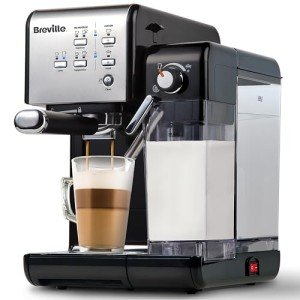11 Ways To Destroy Your Italian Espresso Machines
Heat Exchange Espresso Machines: A Comprehensive Guide
Espresso machines have actually evolved considerably throughout the years, dealing with the requirements of home baristas and coffee specialists alike. Among these machines, heat exchange espresso machines have acquired appeal due to their capability to deliver constant efficiency and extraordinary brew quality. In Manual Espresso Machines , we will check out the workings, benefits, and essential functions of heat exchange espresso machines, providing a thorough understanding for both possible purchasers and coffee lovers.
Comprehending Heat Exchange Technology
Heat exchange espresso machines run on an unique principle that enables simultaneous water heating for developing and steaming. They are geared up with a single boiler that uses a heat exchanger system. This function is considerable as it makes it possible for users to brew espresso while steaming milk concurrently, promoting effectiveness in the coffee-making procedure.
How Does a Heat Exchange Espresso Machine Work?
The process starts with the machine's water inlet filling the boiler. As the water warms up, it turns to steam. The innovative heat exchanger uses hot steam to heat additional water in a separate passage created particularly for the brew group. This means that water can reach the ideal brewing temperature level without waiting on the boiler to change. The crucial steps include:
- Water Fill: Water is drawn into the boiler.
- Heating Process: The boiler warms up as water is converted into steam.
- Heat Exchange: Steam heats up water in the heat exchanger tube.
- Developing: Water from the heat exchanger is pushed through coffee grounds, extracting the tastes required for a rich espresso.
This process enables for quick temperature modifications and enhanced coffee extraction.
Advantages of Heat Exchange Espresso Machines
Heat exchange espresso machines provide a number of advantages, especially for those looking to optimize their coffee experience. Here are some essential benefits:
- Simultaneous Brewing and Steaming: Users can brew espresso while steaming milk, making it ideal for busy coffee shops and home baristas who value effectiveness.
- Temperature level Stability: The boiler's steam pressure helps keep a stable temperature, which is important for constant espresso extraction.
- Versatility: The design permits fast switching in between developing and steaming, making it easier to produce various coffee drinks, from lattes to cappuccinos.
- Easy to use: Models frequently feature available controls, making it feasible for both novices and skilled baristas to produce quality beverages.
- Professional Quality: Heat exchange machines are often used in commercial settings, supplying users with high-quality brewing efficiency at home.
Secret Features to Look for in Heat Exchange Espresso Machines
When thinking about the purchase of a heat exchange espresso machine, there are a number of features that a person ought to take into consideration:
- Build Quality: Look for machines made from long lasting products, such as stainless-steel or brass, ensuring longevity.
- Boiler Size: A larger boiler will hold more water and sustain higher output with time.
- PID Temperature Control: This feature assists preserve consistent brew temperatures, which can boost the coffee-making procedure.
- Group Head Design: Machines with a saturated or semi-saturated group head provide much better temperature level stability.
- Reduce of Use: User-friendly user interfaces and user-friendly controls improve the general experience for baristas at all skill levels.
- Steam Wand Quality: A good steam wand with proper insulation and flexibility permits much better texturing of milk.
- Water Reservoir Size: Depending on your needs, think about how often you want to fill up the water tank.
Contrast of Popular Heat Exchange Espresso Machines
To better understand the options readily available in the market, below is a contrast table of some popular heat exchange espresso machines:
Machine Model
Boiler Size
PID Control
Cost Range
User Ratings
Profitec Pro 700
2.0 L
Yes
₤ 2,000-₤ 2,500
9.5/ 10
Rocket Espresso R58
1.8 L
Yes
₤ 2,400-₤ 2,800
9.4/ 10
Elekta Bianca
1.8 L
Yes
₤ 2,500-₤ 3,000
9.6/ 10
La Spaziale S1 Vivaldi II
1.5 L
Yes
₤ 1,800-₤ 2,200
9.2/ 10
Bezzera Magica
1.2 L
No
₤ 1,600-₤ 1,800
9.0/ 10
FAQs About Heat Exchange Espresso Machines
What is the primary difference in between a heat exchange and a dual boiler espresso machine?
While both types can brew espresso and steam milk at the exact same time, dual boiler machines have separate boilers for developing and steaming. On the other hand, heat exchange machines use a single boiler and a heat exchanger to attain the same function.
Are heat exchange machines suitable for beginners?
Yes! Many heat exchange machines are developed with user-friendly features, making them available for newbies. With appropriate assistance and practice, users can quickly produce quality espresso.
What sort of maintenance do heat exchange espresso machines require?
Routine upkeep consists of descaling, cleaning up the boiler, checking seals and gaskets, and keeping the group head tidy. Regular maintenance guarantees longevity and consistent performance.
Can I use a heat exchange machine for various kinds of coffee beverages?
Definitely! Heat exchange machines allow users to produce a variety of coffee drinks, consisting of espresso, lattes, coffees, and more.
Heat exchange espresso machines represent a mix of innovation and tradition, supplying coffee lovers with the tools needed for crafting the perfect cup. Their ability to all at once brew and steam, integrated with accurate temperature level control, makes them a compelling choice for both home baristas and experts. With the ideal understanding on functions and maintenance, users can open a world of exquisite coffee experiences, guaranteeing that each sip is as wonderful as the last.
